Traditional and Language
Traditional and Language


#1 слайд
1 слайд

#2 слайд
2 слайд
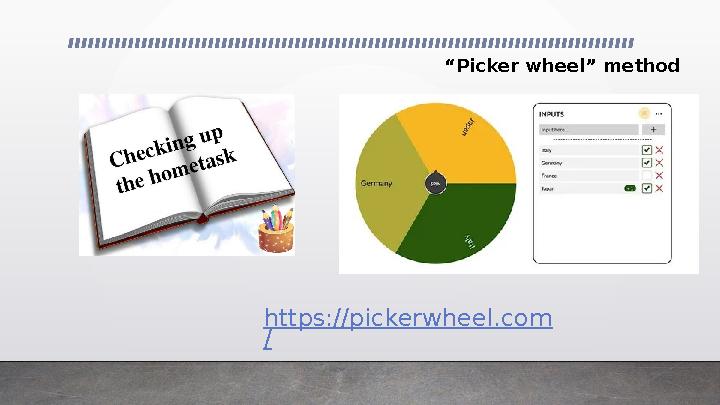
#3 слайд
https://pickerwheel.com
/ “ Picker wheel” method
3 слайд
https://pickerwheel.com / “ Picker wheel” method
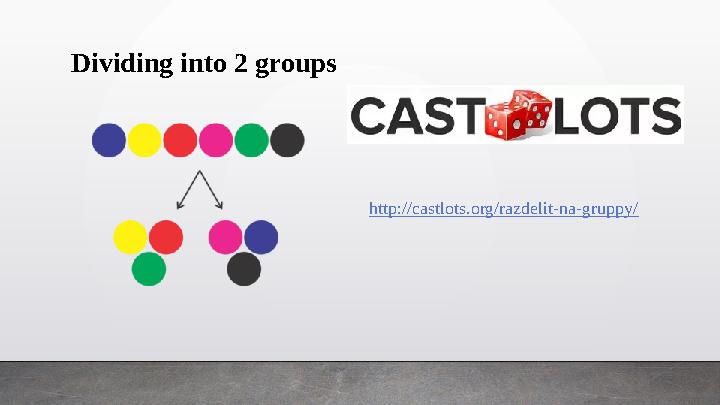
#4 слайд
Dividing into 2 groups
http://castlots.org/razdelit-na-gruppy/
4 слайд
Dividing into 2 groups http://castlots.org/razdelit-na-gruppy/
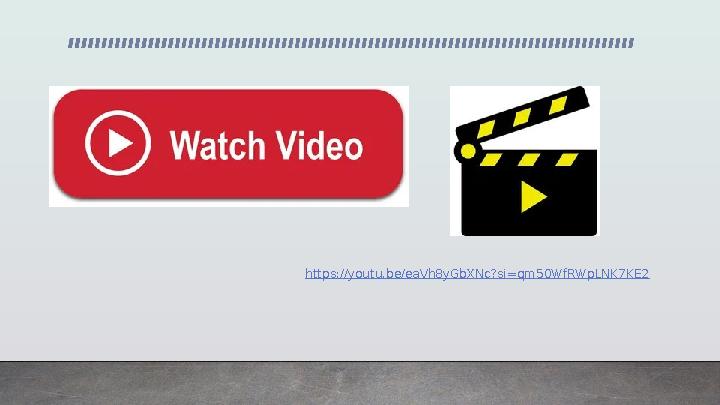
#5 слайд
https://youtu.be/eaVh8yGbXNc?si=qm50WfRWpLNK7KE2
5 слайд
https://youtu.be/eaVh8yGbXNc?si=qm50WfRWpLNK7KE2
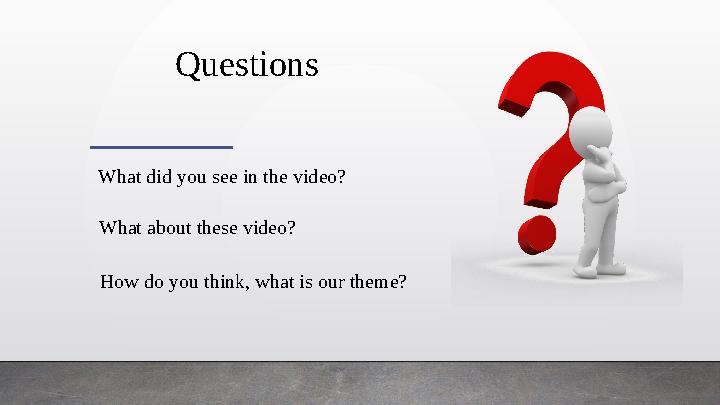
#6 слайд
Q uestions
What did you see in the video?
How do you think, what is our theme?What about these video?
6 слайд
Q uestions What did you see in the video? How do you think, what is our theme?What about these video?
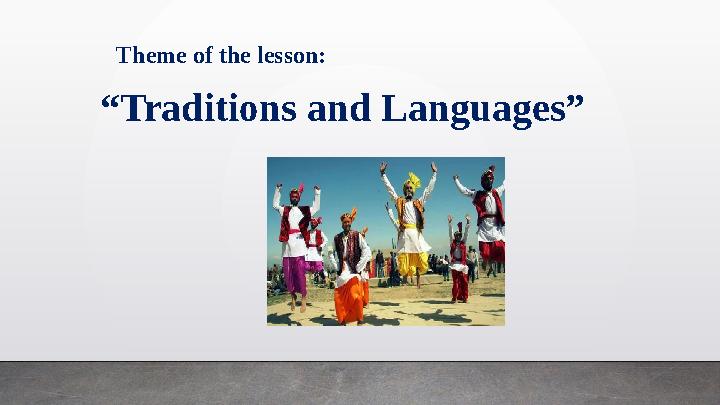
#7 слайд
Theme of the lesson:
“ Traditions and Languages”
7 слайд
Theme of the lesson: “ Traditions and Languages”
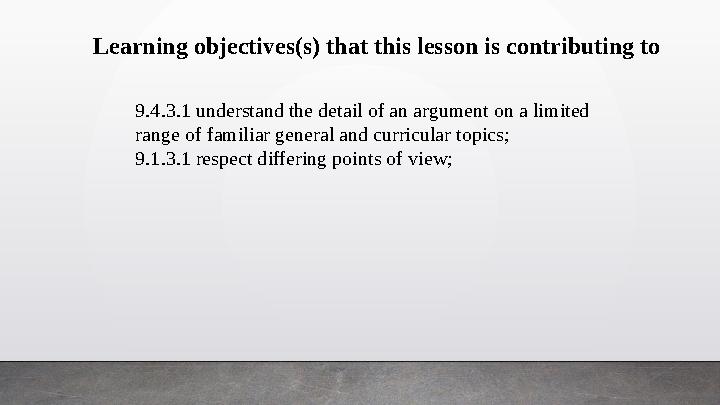
#8 слайд
Learning objectives(s) that this lesson is contributing to
9.4.3.1 understand the detail of an argument on a limited
range of familiar general and curricular topics;
9.1.3.1 respect differing points of view;
8 слайд
Learning objectives(s) that this lesson is contributing to 9.4.3.1 understand the detail of an argument on a limited range of familiar general and curricular topics; 9.1.3.1 respect differing points of view;
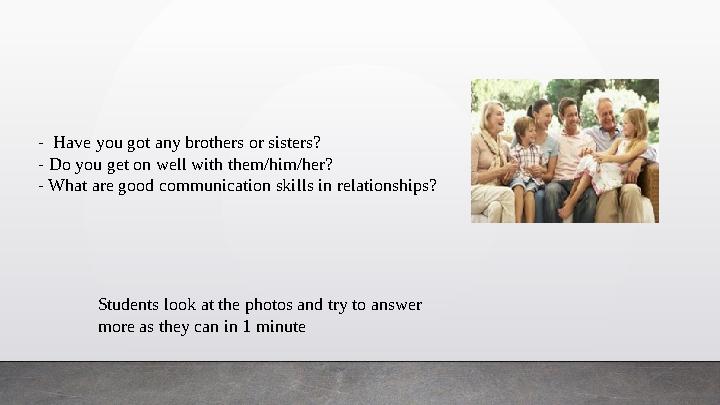
#9 слайд
Students look at the photos and try to answer
more as they can in 1 minute- Have you got any brothers or sisters?
- Do you get on well with them/him/her?
- What are good communication skills in relationships?
9 слайд
Students look at the photos and try to answer more as they can in 1 minute- Have you got any brothers or sisters? - Do you get on well with them/him/her? - What are good communication skills in relationships?
![New words Made up [meɪd ʌp] Құрастырылған Calm down [kɑːm daʊn] Тыныштал Passed down [pɑːst daʊn] Мұрагерлік Find out [faɪnd New words Made up [meɪd ʌp] Құрастырылған Calm down [kɑːm daʊn] Тыныштал Passed down [pɑːst daʊn] Мұрагерлік Find out [faɪnd](https://api.ust.kz/storage/files/materials/pptx/image/2024/february/d11/170764846041-10.jpeg)
#10 слайд
New words
Made up [meɪd ʌp] Құрастырылған
Calm down [kɑːm daʊn] Тыныштал
Passed down [pɑːst daʊn] Мұрагерлік
Find out [faɪnd aʊt] Білу
Got mad [gɒt mæd] Ашуланды
Came up with [keɪm ʌp wɪð] Ойлап
тапты
Looked into [lʊkt ˈɪntuː] Қарады
Kept on [kept ɒn] Жалғастырды
Marriage [ˈmærɪʤ] Неке
10 слайд
New words Made up [meɪd ʌp] Құрастырылған Calm down [kɑːm daʊn] Тыныштал Passed down [pɑːst daʊn] Мұрагерлік Find out [faɪnd aʊt] Білу Got mad [gɒt mæd] Ашуланды Came up with [keɪm ʌp wɪð] Ойлап тапты Looked into [lʊkt ˈɪntuː] Қарады Kept on [kept ɒn] Жалғастырды Marriage [ˈmærɪʤ] Неке
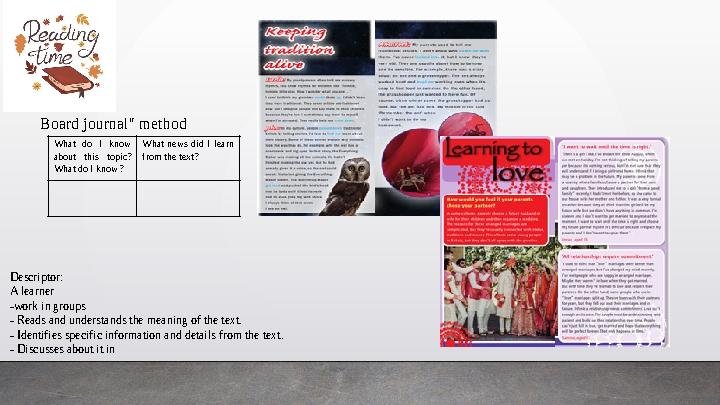
#11 слайд
What do I know
about this topic?
What do I know? What news did I learn
from the text?
Board journal" method
Descriptor:
A learner
-work in groups
- Reads and understands the meaning of the text.
- Identifies specific information and details from the text.
- Discusses about it in
11 слайд
What do I know about this topic? What do I know? What news did I learn from the text? Board journal" method Descriptor: A learner -work in groups - Reads and understands the meaning of the text. - Identifies specific information and details from the text. - Discusses about it in
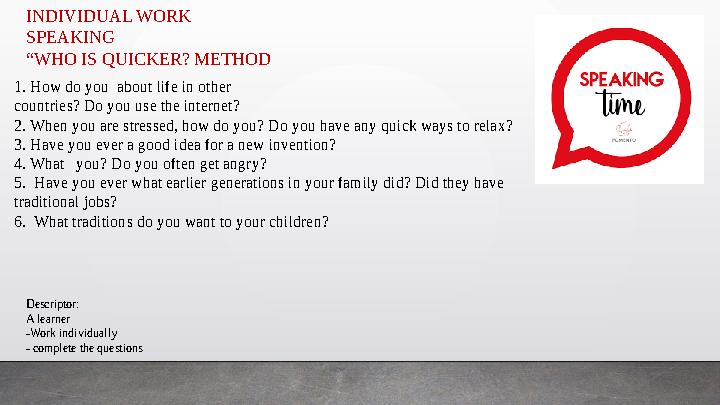
#12 слайд
INDIVIDUAL WORK
SPEAKING
“ WHO IS QUICKER? METHOD
1. How do you about life in other
countries? Do you use the internet?
2. When you are stressed, how do you? Do you have any quick ways to relax?
3. Have you ever a good idea for a new invention?
4. What you? Do you often get angry?
5. Have you ever what earlier generations in your family did? Did they have
traditional jobs?
6. What traditions do you want to your children?
Descriptor:
A learner
-Work individually
- complete the questions
12 слайд
INDIVIDUAL WORK SPEAKING “ WHO IS QUICKER? METHOD 1. How do you about life in other countries? Do you use the internet? 2. When you are stressed, how do you? Do you have any quick ways to relax? 3. Have you ever a good idea for a new invention? 4. What you? Do you often get angry? 5. Have you ever what earlier generations in your family did? Did they have traditional jobs? 6. What traditions do you want to your children? Descriptor: A learner -Work individually - complete the questions
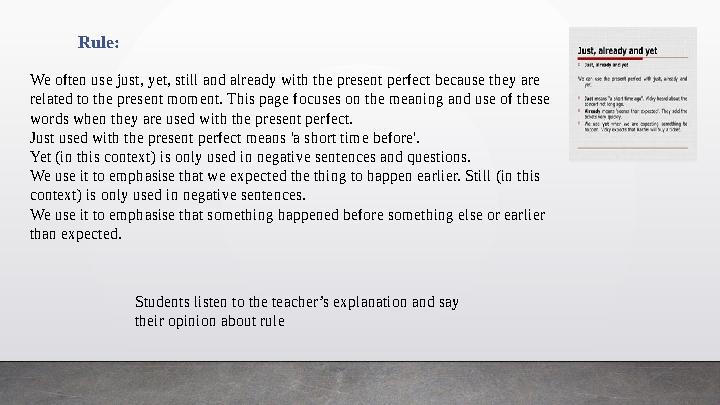
#13 слайд
Rule:
We often use just, yet, still and already with the present perfect because they are
related to the present moment. This page focuses on the meaning and use of these
words when they are used with the present perfect.
Just used with the present perfect means 'a short time before'.
Yet (in this context) is only used in negative sentences and questions.
We use it to emphasise that we expected the thing to happen earlier. Still (in this
context) is only used in negative sentences.
We use it to emphasise that something happened before something else or earlier
than expected.
Students listen to the teacher’s explanation and say
their opinion about rule
13 слайд
Rule: We often use just, yet, still and already with the present perfect because they are related to the present moment. This page focuses on the meaning and use of these words when they are used with the present perfect. Just used with the present perfect means 'a short time before'. Yet (in this context) is only used in negative sentences and questions. We use it to emphasise that we expected the thing to happen earlier. Still (in this context) is only used in negative sentences. We use it to emphasise that something happened before something else or earlier than expected. Students listen to the teacher’s explanation and say their opinion about rule
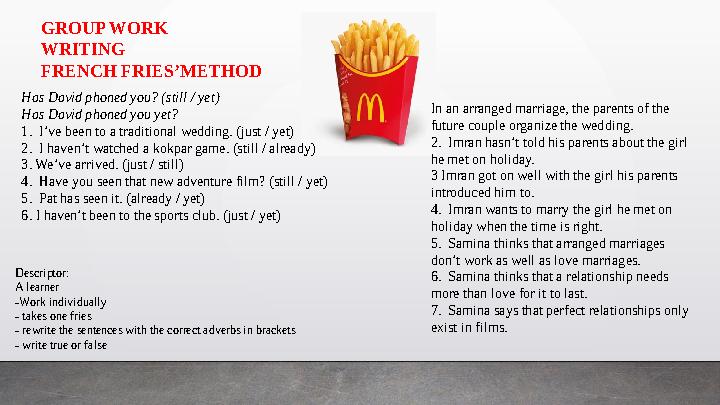
#14 слайд
GROUP WORK
WRITING
FRENCH FRIES’METHOD
Has David phoned you? (still / yet)
Has David phoned you yet?
1. I’ve been to a traditional wedding. (just / yet)
2. I haven’t watched a kokpar game. (still / already)
3. We’ve arrived. (just / still)
4. Have you seen that new adventure film? (still / yet)
5. Pat has seen it. (already / yet)
6. I haven’t been to the sports club. (just / yet) In an arranged marriage, the parents of the
future couple organize the wedding.
2. Imran hasn’t told his parents about the girl
he met on holiday.
3 Imran got on well with the girl his parents
introduced him to.
4. Imran wants to marry the girl he met on
holiday when the time is right.
5. Samina thinks that arranged marriages
don’t work as well as love marriages.
6. Samina thinks that a relationship needs
more than love for it to last.
7. Samina says that perfect relationships only
exist in films.Descriptor:
A learner
-Work individually
- takes one fries
- rewrite the sentences with the correct adverbs in brackets
- write true or false
14 слайд
GROUP WORK WRITING FRENCH FRIES’METHOD Has David phoned you? (still / yet) Has David phoned you yet? 1. I’ve been to a traditional wedding. (just / yet) 2. I haven’t watched a kokpar game. (still / already) 3. We’ve arrived. (just / still) 4. Have you seen that new adventure film? (still / yet) 5. Pat has seen it. (already / yet) 6. I haven’t been to the sports club. (just / yet) In an arranged marriage, the parents of the future couple organize the wedding. 2. Imran hasn’t told his parents about the girl he met on holiday. 3 Imran got on well with the girl his parents introduced him to. 4. Imran wants to marry the girl he met on holiday when the time is right. 5. Samina thinks that arranged marriages don’t work as well as love marriages. 6. Samina thinks that a relationship needs more than love for it to last. 7. Samina says that perfect relationships only exist in films.Descriptor: A learner -Work individually - takes one fries - rewrite the sentences with the correct adverbs in brackets - write true or false
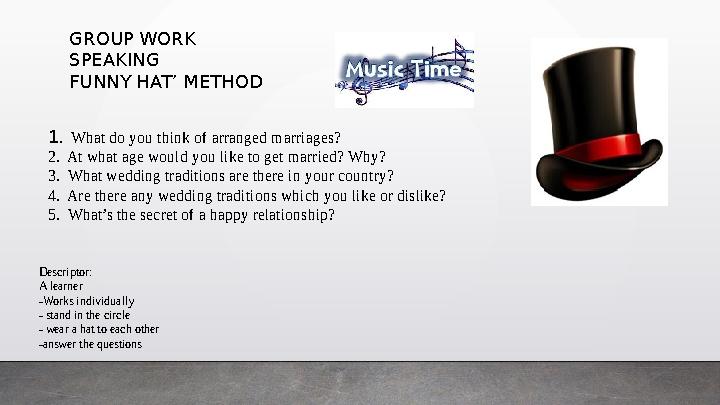
#15 слайд
GROUP WORK
SPEAKING
FUNNY HAT’ METHOD
Descriptor:
A learner
-Works individually
- stand in the circle
- wear a hat to each other
-answer the questions 1 . What do you think of arranged marriages?
2. At what age would you like to get married? Why?
3. What wedding traditions are there in your country?
4. Are there any wedding traditions which you like or dislike?
5. What’s the secret of a happy relationship?
15 слайд
GROUP WORK SPEAKING FUNNY HAT’ METHOD Descriptor: A learner -Works individually - stand in the circle - wear a hat to each other -answer the questions 1 . What do you think of arranged marriages? 2. At what age would you like to get married? Why? 3. What wedding traditions are there in your country? 4. Are there any wedding traditions which you like or dislike? 5. What’s the secret of a happy relationship?
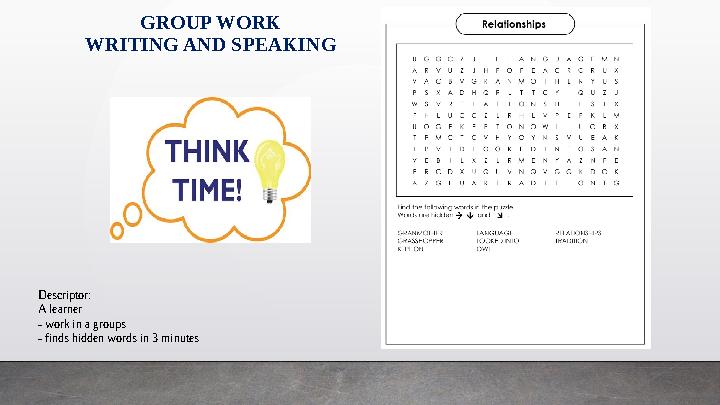
#16 слайд
GROUP WORK
WRITING AND SPEAKING
Descriptor:
A learner
- work in a groups
- finds hidden words in 3 minutes
16 слайд
GROUP WORK WRITING AND SPEAKING Descriptor: A learner - work in a groups - finds hidden words in 3 minutes
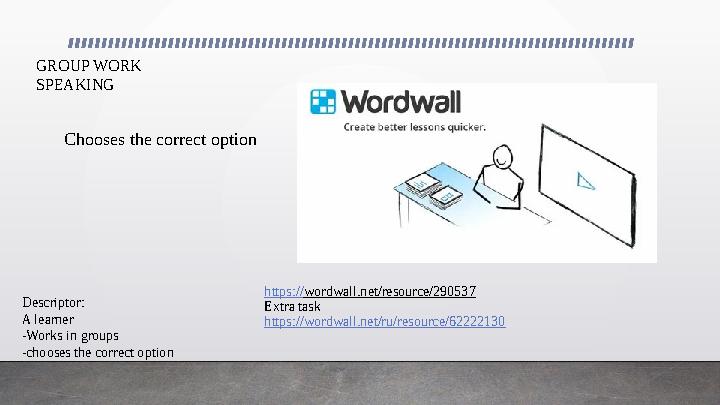
#17 слайд
GROUP WORK
SPEAKING
Descriptor:
A learner
-Works in groups
-chooses the correct option Chooses the correct option
https:// wordwall.net/resource/290537
Extra task
https://wordwall.net/ru/resource/62222130
17 слайд
GROUP WORK SPEAKING Descriptor: A learner -Works in groups -chooses the correct option Chooses the correct option https:// wordwall.net/resource/290537 Extra task https://wordwall.net/ru/resource/62222130
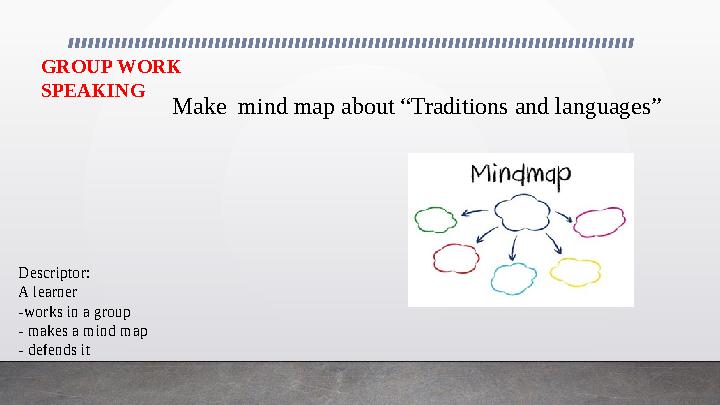
#18 слайд
GROUP WORK
SPEAKING
Make mind map about “Traditions and languages”
Descriptor:
A learner
-works in a group
- makes a mind map
- defends it
18 слайд
GROUP WORK SPEAKING Make mind map about “Traditions and languages” Descriptor: A learner -works in a group - makes a mind map - defends it
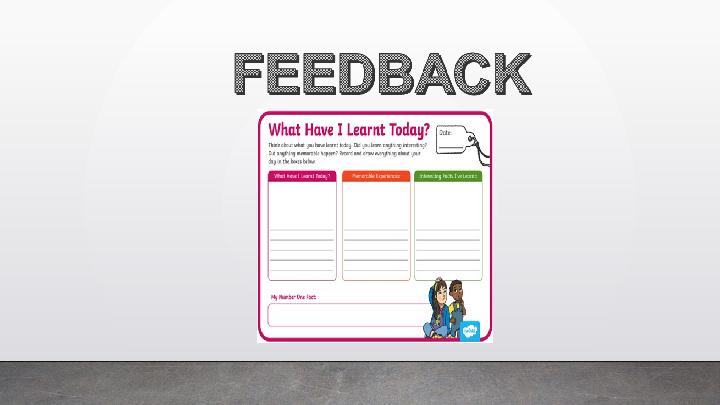
#19 слайд
19 слайд
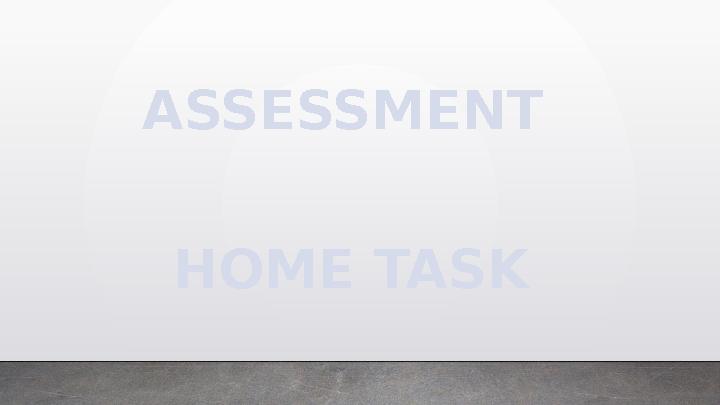
#20 слайд
ASSESSMENT
HOME TASK
20 слайд
ASSESSMENT HOME TASK

#21 слайд
21 слайд

шағым қалдыра аласыз
















